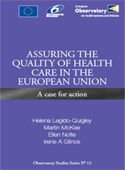Assuring the quality of health care in the European Union. A case for action (2008)

Download
By Helena Legido-Quigley, Martin McKee, Ellen Nolte and Irene A. Glinos
2008, xxviii + 210 pages
ISBN 978 92 890 7193 2
CHF 50.00
In developing countries: CHF 35.00
Order no. 13400076
The European Union’s citizens are on the move. In unprecedented numbers, they are travelling across borders, their passage eased by the removal of national frontiers, the adoption of a common currency, and the growth of low-cost air travel. People have always travelled within Europe for work and leisure, although never before with the current intensity. Now, however, they are travelling for many other reasons, including the quest for key services such as health care.
Whatever the reason for travelling, one question they ask is “If I fall ill, will the health care I receive be of a high standard?”. Until now, they could only go on trust. This book examines, for the first time, the systems that have been put in place in all of the European Union’s 27 Member States. The picture it paints is mixed. Some have well developed systems, setting standards based on the best available evidence, monitoring the care provided, and taking action where it falls short. Others need to overcome significant obstacles.
The European Union has only limited ability to take action on health care but if the free movement of Europe’s citizens is to become a reality, appropriate systems must be in place to ensure high quality care, even if the approaches taken will vary according to local circumstances. This requires a dialogue among those responsible for funding and providing health care in Europe. This book contributes the background needed for the dialogue to begin.
2008, xxviii + 210 pages
ISBN 978 92 890 7193 2
CHF 50.00
In developing countries: CHF 35.00
Order no. 13400076
The European Union’s citizens are on the move. In unprecedented numbers, they are travelling across borders, their passage eased by the removal of national frontiers, the adoption of a common currency, and the growth of low-cost air travel. People have always travelled within Europe for work and leisure, although never before with the current intensity. Now, however, they are travelling for many other reasons, including the quest for key services such as health care.
Whatever the reason for travelling, one question they ask is “If I fall ill, will the health care I receive be of a high standard?”. Until now, they could only go on trust. This book examines, for the first time, the systems that have been put in place in all of the European Union’s 27 Member States. The picture it paints is mixed. Some have well developed systems, setting standards based on the best available evidence, monitoring the care provided, and taking action where it falls short. Others need to overcome significant obstacles.
The European Union has only limited ability to take action on health care but if the free movement of Europe’s citizens is to become a reality, appropriate systems must be in place to ensure high quality care, even if the approaches taken will vary according to local circumstances. This requires a dialogue among those responsible for funding and providing health care in Europe. This book contributes the background needed for the dialogue to begin.



